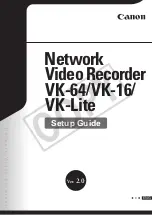
Using the CLI
Editing Features
Page 19
Negating the Effect of Commands
For many configuration commands, the prefix keyword
no
can be entered to cancel the effect of a command or
reset the configuration to the default value. This guide describes the negation effect for all applicable commands.
Command Completion
If the command entered is incomplete, invalid or has missing or invalid parameters, then the appropriate error
message is displayed. This assists in entering the correct command. By pressing the <Tab> button, an incomplete
command is entered. If the characters already entered are not enough for the system to identify a single matching
command, press
?
to display the available commands matching the characters already entered.
Nomenclature
When referring to an Ethernet port in a CLI command, the following format is used:
•
For an Ethernet port on a standalone device:
Ethernet_type port_number
•
For an Ethernet port on a stacked device:
unit_number/Ethernet_type port number
The Ethernet type may be Gigabit Ethernet (indicated by “g”) or Fast Ethernet (indicated by “e”).
For example, g3 stands for Gigabit Ethernet port 3 on a stand-alone device, and e3 stands for Fast Ethernet port 3
on a stand-alone device, whereas 1/g3 stands for Gigabit Ethernet port 3 on stacking unit 1 and 1/e3 stands for
Fast Ethernet port 3 on stacking unit 1.
The ports may be described on an individual basis or within a range. Use format
port number-port number
to
specify a set of consecutive ports and
port number,port number
to indicates a set of non-consecutive ports. For
example, g1-3 stands for Gigabit Ethernet ports 1, 2 and 3, and g1,5 stands for Gigabit Ethernet ports 1 and 5.
Keyboard Shortcuts
The CLI has a range of keyboard shortcuts to assist in editing the CLI commands. The following table describes
the CLI shortcuts.
K e y b o a r d K e y
D e s c r i p t i o n
Up-arrow key
Recalls commands from the history buffer, beginning with the most recent command.
Repeat the key sequence to recall successively older commands.
Down-arrow key
Returns the most recent commands from the history buffer after recalling commands with
the up arrow key. Repeating the key sequence will recall successively more recent
commands.
Ctrl+A
Moves the cursor to the beginning of the command line.
Ctrl+E
Moves the cursor to the end of the command line.
Ctrl+Z / End
Returns back to the Privileged EXEC mode from any configuration mode.
Backspace key
Deletes one character left to the cursor position.
Summary of Contents for AT-8000S Series
Page 1: ...Layer 2 Ethernet Switch Allied Telesyn AT 8000S CLI Reference Guide...
Page 2: ...Allied Telesyn AT 8000S CLI Reference Guide...
Page 15: ...Preface Contacting Allied Telesyn Page 13 Page 13...
Page 23: ...Using the CLI Editing Features Page 21...
Page 61: ...Clock Commands Page 59...
Page 69: ...Configuration and Image File Commands Page 67...
Page 95: ...GVRP Commands Page 93...
Page 103: ...IGMP Snooping Commands Page 101...
Page 107: ...IP Addressing Commands Page 105 IP address Interface Type 10 7 1 192 24 VLAN 1 Static...
Page 119: ...Management ACL Commands Page 117...
Page 123: ...PHY Diagnostics Commands Page 121...
Page 127: ...Port Channel Commands Page 125...
Page 131: ...Port Monitor Commands Page 129...
Page 147: ...QoS Commands Page 145...
Page 153: ...Radius Commands Page 151...
Page 211: ...Spanning Tree Commands Page 209...
Page 221: ...SSH Commands Page 219...
Page 233: ...Syslog Commands Page 231...
Page 245: ...System Management Commands Page 243...
Page 257: ...User Interface Commands Page 255...
Page 283: ...Web Server Commands Page 281...
Page 299: ...802 1x Commands Page 297...
















































